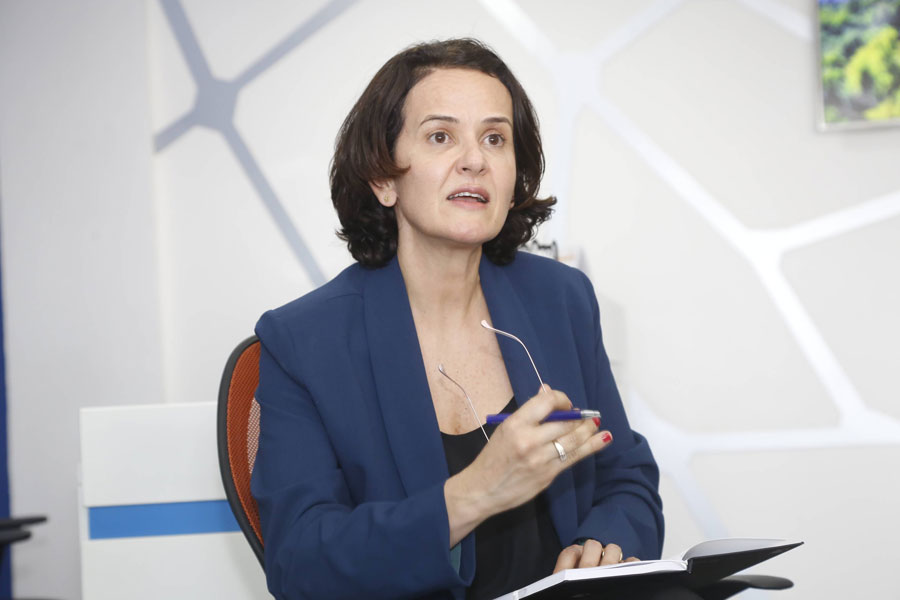
Jun 15 , 2019
By KALAEB GIRMA ( FORTUNE STAFF WRITER )
The government has scaled up the Scaling Solar Program from four to six projects with a total capacity to generate up to 750MW following the new financing received from the World Bank Group.
The program, which is in its second phase, was originally planned to finance independent solar projects in Weranso, Welenchiti, Humera, and Mekele to generate 500MW.
The latest announcement by the World Bank to provide guarantees for private sector participation in generating alternative power source led to the addition of two sites in Metema, Bahir Dar and Hurso with a capacity of generating an extra 250MW of energy.
Accordingly, a tender announced for the selection of pre-qualified bidders was amended with an extended deadline of June 9, 2019.
Currently managed by the Public-Private Partnerships Directorate under the Ministry of Finance, the two-year Scaling Solar Program was launched in 2015 by the World Bank's International Finance Corporation (IFC). The project aims at providing the governments of Sub-Saharan countries with alternative electricity supply solutions and creating a new market for solar investment by promoting privately funded grid-connected solar projects at competitive tariffs.
IFC supervises the entire process all the way from project preparation through project audit and financing to the commissioning of the large-scale solar plants.
Ethiopia is the fourth country to join the program following Zambia, Senegal and Madagascar. In March, Zambia’s Scaling Solar round one program became fully operational by providing 54MW of solar power built at a cost of 56 million dollars.
In the first round of the project, 11 pre-qualified bidders were shortlisted, and they are expected to submit their final proposals to Ethiopian Electric Power before June 28, 2019.
Two months ago 12 pre-qualified developers were shortlisted to develop two solar projects, each with a capacity of up to 125MW under the country's Scaling Solar round one project. However, one of the qualified bidders has withdrawn due to legal issues. The 12 pre-qualified developers were selected from 28 developers, who submitted their proposals in response to a tender announced at the end of 2017.
The winning company will be chosen according to its lowest proposed tariff. The government will then enter into a long-term contract that stretches between 20 to 25 years with the winner, executing a power purchase agreement at an agreed upon tariff. After buying the power from the companies, the government will transmit and distribute the power according to its own tariff.
Last month, Ethiopia secured 200 million dollars in investment from the International Development Association of the World Bank to initiate private sector involvement in the power sector, specifically involving participation in renewable energy generation. Beneficiaries of the program will be the winning companies of the round one and two Scaling Solar projects.
The programme, which will be in the form of loan and payment guarantees, will see the development of 10 to 12 solar and wind energy independent power producers (IPP) with a total installed capacity of about 1,000MW.
Currently, the nation derives most of its electricity supply from government-owned hydroelectric dams, and its national access to electricity stands at 56.7pc. The state power generator has set its billing rates for power at 0.08 dollars a kilowatt, though the distribution rate may reach 0.10 dollars a kilowatt. The government expects that tariffs to be proposed in response to its tender will be around 0.05 dollars a kilowatt.
Had it not been for the Bank's support, the private power producers' rate for power generation would not have been below 0.08 dollars a kilowatt, according to a source from the Ethiopian Electric Utility.
"But after the addition of transmission and distribution, the cost of the electricity would be higher than what the tariff has designated," said this source.
Ethiopian Electric Utility introduced new tariff increases in 2018 that will be phased in over the next four years, eventually reaching an average of 0.07 dollars a kilowatt. Ethiopia’s electricity tariff remains one of the lowest in Sub-Saharan countries with neighbouring Kenya charging 0.15 dollars a kilowatt.
"The plan is for the government to subsidise power generation for a couple of years and then raise the tariffs later," he added.
The project is great at increasing access to electricity in off-grid rural areas, according to Ayele Nigussie (PhD), head of the Electrical Power Engineering Program at Haramaya University.
But Ayele argues that solar power does not go with the nation’s plan of industrial transformation, as solar power is not enough to power industries.
"While the diversification from hydro dependency is good, emphasis on geothermal should be considered," he added.
Gelila Woodeneh, senior communications officer at the World Bank, did not respond to email enquiries from Fortune before the paper went to print.
PUBLISHED ON
Jun 15,2019 [ VOL
20 , NO
998]

Exclusive Interviews | Nov 06,2021

Advertorials | Jun 05,2023

Radar | Jun 08,2019

Radar | Feb 01,2020

Radar | Jul 21,2024

Dec 22 , 2024 . By TIZITA SHEWAFERAW
Charged with transforming colossal state-owned enterprises into modern and competitiv...

Aug 18 , 2024 . By AKSAH ITALO
Although predictable Yonas Zerihun's job in the ride-hailing service is not immune to...

Jul 28 , 2024 . By TIZITA SHEWAFERAW
Unhabitual, perhaps too many, Samuel Gebreyohannes, 38, used to occasionally enjoy a couple of beers at breakfast. However, he recently swit...

Jul 13 , 2024 . By AKSAH ITALO
Investors who rely on tractors, trucks, and field vehicles for commuting, transporting commodities, and f...

Jun 28 , 2025
Meseret Damtie, the assertive auditor general, has never been shy about naming names...

Jun 21 , 2025
A well-worn adage says, “Budget is not destiny, but it is direction.” Examining t...

Jun 14 , 2025
Yet again, the Horn of Africa is bracing for trouble. A region already frayed by wars...

Jun 7 , 2025
Few promises shine brighter in Addis Abeba than the pledge of a roof for every family...